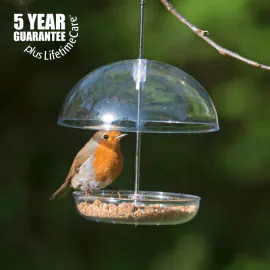Blackbird
Reaching the top 5 of most common bird species in the UK, the blackbird is difficult to miss! Being a member of the thrush family, you'll spot blackbirds in urban, suburban, and rural environments all across the UK. Blackbirds are unsociable and prefer to be alone rather than in large groups.
What does a male blackbird look like?
The male blackbird is possibly one of the easiest birds to identify. With an entirely black plumage and yellow bill, you can understand the inspiration for its name. You can also recognise a male blackbird from the yellow ring around its eye.
What does a female blackbird look like?
Unlike males, female blackbirds don't quite live up to their names. Due to their brown plumage, they are often mistaken for thrushes. She also has a faint light streaking on the throat and breast. Female blackbirds have duller beaks compared to the male's vibrant yellow. Another significant difference between male and female blackbirds is their wing length. On average, females have a shorter wingspan than male blackbirds.
What does a baby blackbird look like?
Like their mothers, juvenile blackbirds will have brown speckly plumage and are also confused with thrushes. You'll often see young blackbirds following around their parents, nagging them for food, even after they've flown the nest. Male juvenile blackbirds will eventually shed their brown plumage so their black feathers can come through.
What do blackbirds eat?
Blackbirds are omnivorous birds with a varied diet that includes both plant and animal matter. Their diet can vary based on geographic location and the time of year. Blackbirds feed on insects, larvae, worms, spiders, and other small invertebrates. In summer, you will often see blackbirds foraging in trees or shrubs for ripe fruits such as berries, cherries, and grapes. Some blackbirds include seeds and nuts in their diet, such as sunflower seeds, sunflower hearts and peanuts. In agricultural areas, blackbirds may feed on grains such as corn, wheat, or rice. Blackbirds are particularly fond of suet bird food, particularly in winter when natural food sources are low, and they need high-energy food to maintain fat and body heat.
What to feed blackbirds
We offer a variety of blackbird food to meet their dietary requirements throughout the year. Here is a selection of the top foods to feed blackbirds.
Are blackbirds ground-feeding birds?
Yes, many blackbird species are ground-feeding birds. They forage on the ground for a variety of food sources, including insects, worms, seeds, and fallen fruits. Their foraging often involves scratching through leaf litter, probing the soil, or searching for food in grassy areas. This ground-feeding behaviour is a common characteristic of many thrushes. When feeding blackbirds in the garden, they'll be most comfortable using bird tables, ground feeders, and hanging bird feeders with large perches. Here are some feeders that blackbirds love to use.
Where do blackbirds nest?
Blackbird nests can be found in shrubs, trees, climbers, and even inside buildings, as females like to build them low down with appropriate cover. Plant materials such as grass, twigs, and straw are used to create the nest, and it can take up to two weeks to be fully assembled. Blackbirds will readily use nest boxes with open fronts and if you would like to give them a helping hand, you can also place an open-fronted nest box in your garden or outdoor space.
When do blackbirds nest?
The breeding season for Blackbirds takes place between March and July. On average, blackbirds can rear 2-3 broods in a single season, but this is heavily dependent on weather conditions. How dry or wet the season is will influence the number of broods the blackbird has. At times, records have shown blackbirds to have 4 broods in a single season.
How long do blackbird eggs take to hatch?
A single blackbird brood can have as many as 3 - 5 eggs. Once laid, it takes around 14 days for blackbird eggs to hatch. The mother and father will then feed their chicks garden bugs until they are ready to fledge.
Do blackbirds mate for life?
Yes, blackbirds are very loyal and will stay with their partner until death. The male will assist the female in finding suitable nesting areas to ensure she feels most comfortable. He will continue to support her throughout the breeding season, and with every brood she delivers.
Do blackbirds migrate?
Yes, blackbirds are technically migratory. Even though the garden blackbirds we see day to day are territorial and won't roam far from their home, northern European blackbirds will fly southwest to escape the harsh cold. Many Scandinavian blackbirds will make their way to the UK as the climate is slightly warmer, increasing our blackbird population to 10-15 million during the winter months.
Do blackbirds return to the same garden?
Yes, especially if your garden is within their territory. Blackbirds will claim areas that can meet their needs for food, water, shelter, and nesting sites. So if you would like your blackbird to be a frequent visitor to your garden, make sure you have a regular supply of food and water.

